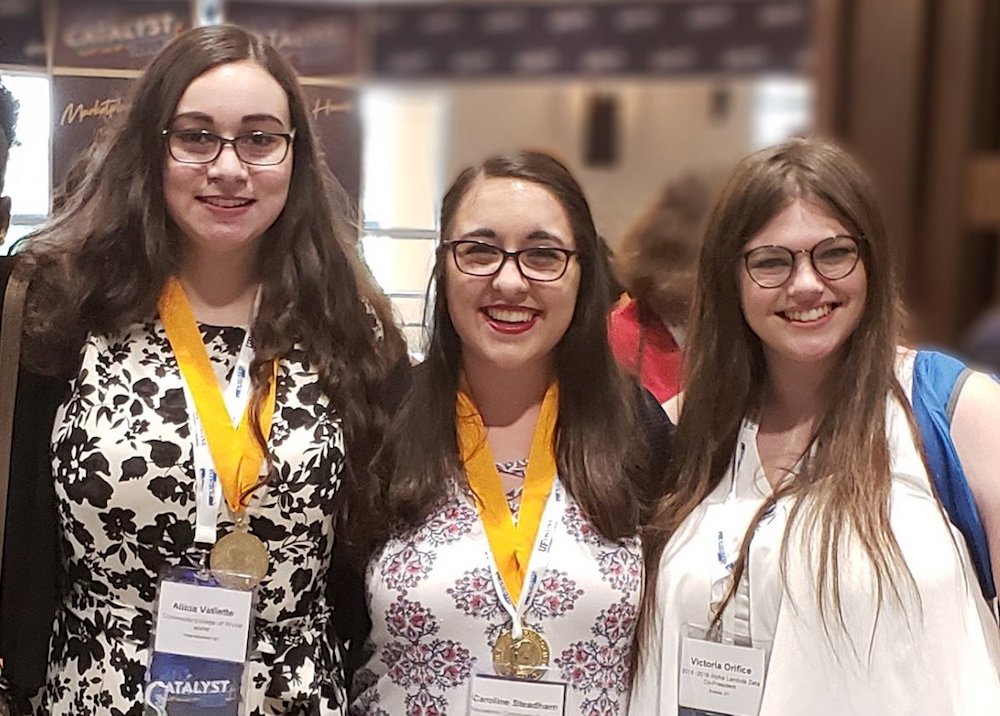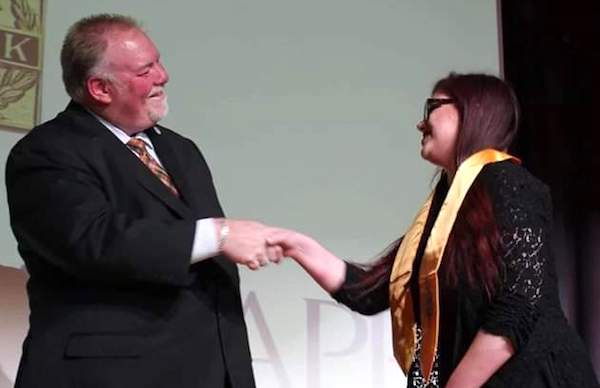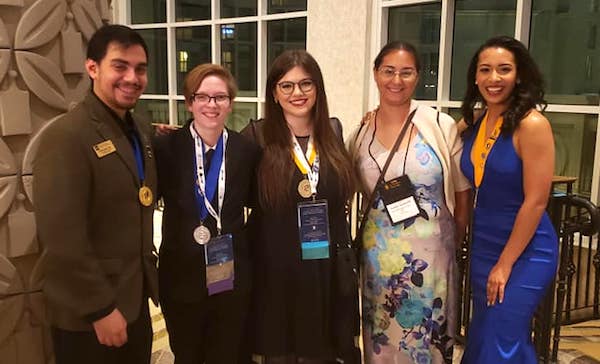Turning “I Can’t” Into “I Can Try”

Editor’s Note: This post was written by Victoria Orifice, International Vice President for Division 1.
I try not to talk about my past too much. It wasn’t all bad, it had its highs and lows, and it made me who I am, but when I graduated high school I was at rock bottom. Between depression, anxiety, agoraphobia, chronic fatigue syndrome, fibromyalgia, and over 90 absences on my record for that year alone, graduating that year was not a given.
Three things got me that diploma — my stellar standardized test scores winning over the high school administration, a 504 plan that let me complete my classwork remotely at the expense of any instruction, and my own determination to just be done with it.
It felt like my whole life up to that point was characterized by the words “I can’t.”
“I can’t go to school today.”
“I can’t go on that field trip, I missed too many classes.”
“I can’t hang out with my friends, I have too much make-up work.”
“I can’t participate in drama club, I wouldn’t be able to make that time commitment.”
“I can’t take the AP tests because I’m just too sick.”
“I can’t go to a big-name college with that kind of absenteeism.”
“I can’t apply for scholarships if I’m barely even going to school.”
“I can’t…”
I graduated high school, and I did what I could do — continue my educational journey at Asnuntuck Community College, a school I’d already started attending through the high school partnership program. My foot was already in the door, they offered night and online classes — maybe this could be my first step.
There’s an oft-quoted phrase from Star Wars, “There is no try, only do.” It has its place in this world; the confidence that you will succeed and the willingness to see something through can be so empowering. But not every person starts at equal footing, where trying is the baseline. You have to be willing to start trying before you start doing. It takes so much courage to stop pushing yourself down and instead reach out and take that first step.
For the first time, I had turned that omnipresent “I can’t” into “Okay, I can try.”
 I took primarily night classes with some of the kindest instructors I’ve ever met. I spoke with disability services and got an accommodation list, carefully worded to provide me with a safety net made of gossamer — after all, what can you do for a student whose primary disability leads to a lack of attendance? I learned to self-accommodate, to make room for myself in my own life. I worked retail part-time, and I began the painstaking process of healing and rebuilding.
I took primarily night classes with some of the kindest instructors I’ve ever met. I spoke with disability services and got an accommodation list, carefully worded to provide me with a safety net made of gossamer — after all, what can you do for a student whose primary disability leads to a lack of attendance? I learned to self-accommodate, to make room for myself in my own life. I worked retail part-time, and I began the painstaking process of healing and rebuilding.
I completed my first semester at Asnuntuck with a 3.94 GPA, which, alongside my previously transferred in grades from a few high school classes, put me in the range for Phi Theta Kappa membership. When my psychology professor and later PTK advisor Dr. Heather D’Orlando mentioned the meeting times, I was absently interested.
“Sure,” I said. “I can try.”
Then, I went to the induction, where the leadership of the students and the keynote speaker instilled me with a passion for Phi Theta Kappa, its mission, and its ability to serve as a vehicle for change and empowerment.
If you’re reading this, you can probably guess what happened next.
When I was in high school, I never really found my people. I couldn’t join any organizations due to the nature of my 504 plan, and even if I could it probably would’ve been too much for me at the time. I could count my friends on one hand and my acquaintances on two, but the days where the idea of going to school caused immediate nausea were beyond number. It was like there was this brick wall between me and that building, and every time I went back it felt worse, and worse, and worse.
Asnuntuck Community College’s crowning jewel is its small, family-like environment. Even when I was attending classes as part of the high school partnership, I could see that. I could see the way the students connected throughout the campus organizations and in classes, and I wanted to be a part of it with everything in my being. As I sat in that induction ceremony, passing the “light of intellectual friendship” to the people beside me, I felt it. The chance to finally break into this community, a community full of people with stories not dissimilar to my own.
And, for the first time in a very long time, I took it.
 Asnuntuck’s Alpha Lambda Zeta chapter handed me the majority of the people I now call family, be it through the chapter, the region, or on an international level. And with every person I met, every victory I helped my chapter claim, every task completed, every time I made myself, my chapter, or my advisors proud, I said “I can’t” less and “I can try” more and more. The failures were still there, the mistakes still hurt, but both hurt less and less, and I learned how to learn from them in ways that were constructive rather than disabling.
Asnuntuck’s Alpha Lambda Zeta chapter handed me the majority of the people I now call family, be it through the chapter, the region, or on an international level. And with every person I met, every victory I helped my chapter claim, every task completed, every time I made myself, my chapter, or my advisors proud, I said “I can’t” less and “I can try” more and more. The failures were still there, the mistakes still hurt, but both hurt less and less, and I learned how to learn from them in ways that were constructive rather than disabling.
I learned to say yes to every opportunity and reversed the narrative to the point where I finally had to start learning how to say no.
Run for regional president: “I can try.”
Go live on the college radio station for three hours a week: “I can try.”
Apply for major scholarships through PTK: “I can try.”
Take an internship at a radio station: “I can try.”
Serve another year as a regional officer: “I can try.”
Create a podcast and radio show: “I can try.”
Get our chapter’s project published in Civic Scholar: “I can try.”
Run for Division 1 Vice President: “I can definitely try.”
The things I’ve done since I graduated high school in 2016 would, I think, make the small, sad, struggling person I used to be proud. I am far from perfect, but self-growth and planning for my future are my top priorities. When I see an opportunity, I’ve learned to grab at it with both hands outstretched. Just as importantly, when I fail, I analyze, learn, and try again. I rebuilt myself and my support system from the ground up, and I’m still building and rebuilding, learning and growing, and, most importantly, trying.
That is my challenge to you as well. If you see an opportunity that even a small part of you wants to take, shrug and ask yourself, “Why not?” If you see something that would benefit you and your life, that could give you an amazing experience, a chance to network, an opportunity to grow, take it and don’t look back. Maybe it won’t work out for you — there’s value in that, too. But do yourself the service of saying “I can try” first.
